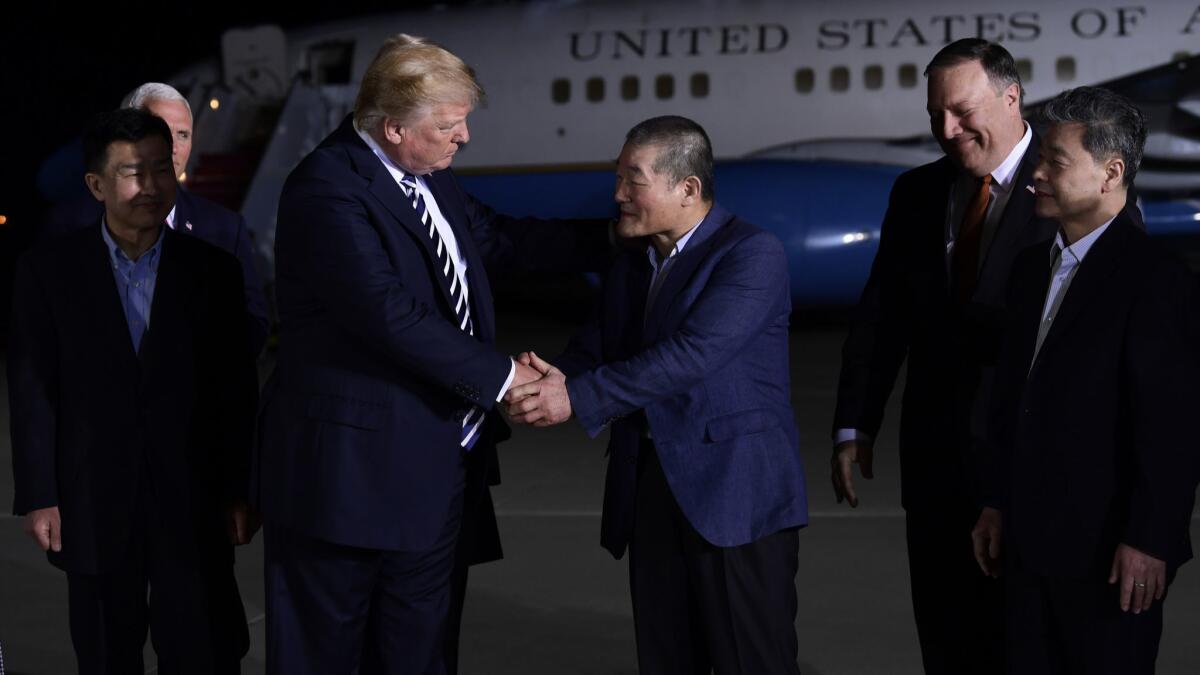Trump greets 3 Americans freed by North Korea

- Share via
Reporting from JOINT BASE ANDREWS, Md. — Three Americans who were detained in North Korea for more than a year were greeted by President Trump beneath a giant American flag after they returned to the mainland U.S. early Thursday.
Despite a middle-of-the-night landing, First Lady Melania Trump and a host of senior administration officials joined Trump to celebrate the occasion. The president and first lady boarded the medical plane on which the men traveled to have a private moment with them.
The men, Kim Dong Chul, Kim Hak Song and Tony Kim, were released Wednesday amid a warming of relations between the longtime adversaries. Secretary of State Mike Pompeo secured their release in Pyongyang after meeting with North Korean leader Kim Jong Un on final plans for a Trump-Kim summit. The Americans had boarded Pompeo’s plane out of North Korea without assistance and then transferred in Japan to a Boeing C-40 outfitted with medical facilities for the trip back to the U.S.
According to the White House, the three men would be taken to Walter Reed National Military Medical Center for evaluation and medical treatment. Their families were not on hand for the arrival.
Shortly after they touched down on U.S. soil in Alaska — for a refueling stop Wednesday afternoon — the State Department released a statement from the freed men.
“We would like to express our deep appreciation to the United States government, President Trump, Secretary Pompeo, and the people of the United States for bringing us home,” they said. “We thank God, and all our families and friends who prayed for us and for our return. God Bless America, the greatest nation in the world.”
Singapore has emerged as the likely summit site, late this month or in early June, as Trump seeks to negotiate denuclearization of the Korean peninsula in his highest-stakes foreign policy effort yet. Trump announced Wednesday that the demilitarized zone between the Koreas would not host the summit. Pompeo said the meeting would last one day, possibly two.
Trump made a point of publicly thanking North Korea’s leader for the prisoners’ release — “I appreciate Kim Jong Un doing this” — and hailed it as a sign of cooling tensions and growing opportunity on the Korean peninsula. Kim decided to grant amnesty to the three Americans at the “official suggestion” of the U.S. president, said North Korea’s official news agency, KCNA.
North Korea had accused the three Korean Americans of anti-state activities. Their arrests were widely seen as politically motivated and had compounded the dire state of relations over the isolated nation’s nuclear weapons.
Trump entered office as an emboldened North Korea developed new generations of nuclear weapons and ballistic missiles capable of hitting the continental U.S. Those advances were the subject of President Obama’s starkest warning shortly before Trump took office, and this is a crisis he’s convinced his negotiating skills can resolve.
Crediting himself for recent progress, Trump has pointed to Kim’s willingness to come to the negotiating table as validating U.S. moves to tighten sanctions — branded “maximum pressure” by the president. The wee-hours ceremony Thursday was an early celebration for an issue that has already put the prospect of a Nobel Peace Prize on Trump’s mind.
“Everyone thinks so, but I would never say it,” he said Wednesday when asked if the award was deserved.
The release capped a dramatic day of diplomacy in Pyongyang. After Pompeo’s 90-minute meeting with Kim Jong Un, he gave reporters a fingers-crossed sign when asked about the prisoners as he returned to his hotel. It was only after a North Korean emissary arrived a bit later to inform him that the release was confirmed.
The three had been held for periods ranging from one to two years. They were the latest in a series of Americans who have been detained by North Korea in recent years for seemingly small offenses and typically freed when senior U.S. officials or statesmen personally visited to bail them out.
More to Read
Sign up for Essential California
The most important California stories and recommendations in your inbox every morning.
You may occasionally receive promotional content from the Los Angeles Times.













